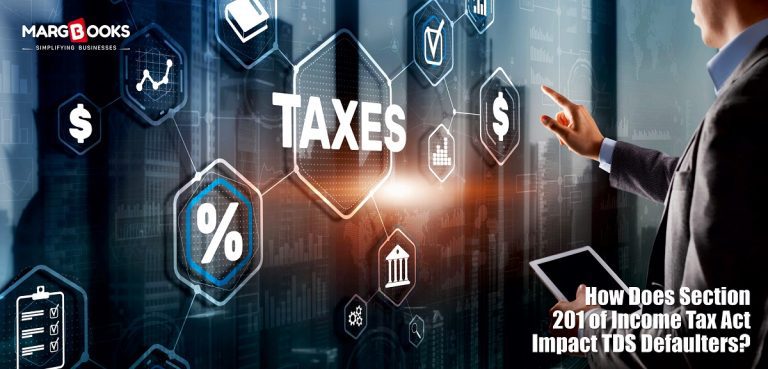If you’re a business owner, accountant, or someone dealing with taxes, then TDS (Tax Deducted at Source) is not a new term for you. But what happens when TDS isn’t deducted or deposited properly? That’s where Section 201 of Income Tax Act steps in – and trust us, you don’t want to be on the wrong side of it.
In this blog, we’ll break down what Section 201 is all about, how it affects TDS defaulters, and how smart businesses are staying compliant with the help of tools like MargBooks , the best GST billing software in India.
What Is Section 201 of Income Tax Act?
Section 201 of the Income Tax Act, 1961 is essentially the big stick used by the Income Tax Department to deal with TDS defaulters. According to this section, if any person (including a company) is responsible for deducting tax at source:
- Fails to deduct TDS, or
- Deducts TDS but fails to deposit it with the government.
Then they are considered an “assessee by default.” In simple terms, they are treated as if they never paid that tax at all.
Consequences Under Section 201: Why You Shouldn’t Ignore It
Now, you might think, “Okay, so I missed a payment or two, I’ll fix it later.” But here’s where it gets serious. The consequences under Section 201 of Income Tax Act can hit your business hard.
1. Interest Penalties
- 1% per month (or part of a month) from the date TDS was deductible to the date it was actually deducted.
- 1.5% per month (or part of a month) from the date of deduction to the date of actual deposit.
2. Disallowance of Expenses
Under Section 40(a)(ia), 30% of the expense on which TDS wasn’t deducted or paid can be disallowed. That’s a big blow during audits.
3. Prosecution and Penalty
In extreme cases, failure to pay TDS can result in rigorous imprisonment for up to 7 years, along with fines.
Exceptions to Being Deemed “Assessee in Default”
There is a slight relief provided by the CBDT (Central Board of Direct Taxes). A person won’t be treated as an assessee in default if:
- The payee has filed their income tax return.
- The amount is disclosed in their return.
- The taxes have been paid.
- The deductor obtains a CA certificate (Form 26A).
While this helps, it’s still a cumbersome process and best avoided by staying compliant from the start.
How to Avoid Trouble Under Section 201?
Avoiding the wrath of Section 201 of Income Tax Act is simpler than you think. It’s all about timely compliance and using the right digital tools.
Use Reliable Online Billing Software
Gone are the days when manual entries ruled your accounts. Now, businesses are switching to online billing software that automatically tracks invoices, calculates GST, and flags TDS requirements.
Choose the Best GST Billing Software – MargBooks
MargBooks is a cloud-based accounting and billing software designed specifically for Indian businesses. It not only helps with GST filing and invoicing but also makes it easy to manage TDS compliance.
Here’s why many SMEs and tax consultants trust MargBooks :
- Auto-detection of TDS on payments
- Real-time TDS reports
- One-click TDS filing integration
- Alerts and reminders for due dates
- Supports Form 26Q, 27Q and more
So, instead of scrambling at the end of the quarter, you’re always audit-ready.
Real-Life Scenario: A Costly Mistake
Let’s take a real-life inspired example.
Rajesh runs a mid-sized business in Pune. In FY 2023-24, he forgot to deduct TDS on contractor payments worth ₹10 lakhs through our GST billing software. The tax officer later detected this and applied Section 201.
- Interest penalty: ₹15,000+
- Disallowed expense: ₹3 lakhs added to taxable income
- Late filing fines and notices followed
If Rajesh had used MargBooks, the system would have auto-flagged the transaction and helped him avoid the blunder entirely.
Key Takeaways
Let’s quickly summarise what we’ve learnt:
- Section 201 of Income Tax Act treats TDS defaulters seriously and imposes penalties, interest, and disallowances.
- Avoiding TDS compliance isn’t just risky – it’s costly.
- Using reliable online billing software like MargBooks can make a massive difference in keeping your business compliant.
- Don’t leave your tax compliance to chance. Automate it.
Final Thoughts
Tax laws in India aren’t always easy to interpret, but one thing is clear – Section 201 of Income Tax Act is not to be taken lightly. Whether you’re running a small enterprise or managing accounts for a large firm, staying TDS-compliant should be at the top of your list.
If you’re still relying on spreadsheets or manual entries, it’s high time to upgrade to the best GST billing software like MargBooks . Not only will it keep you on the right side of the law, but it’ll also make your life a whole lot easier.




